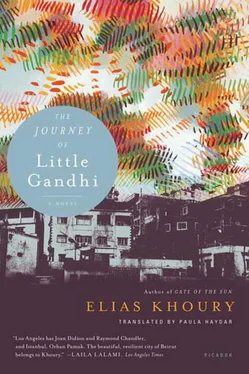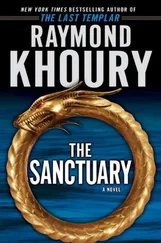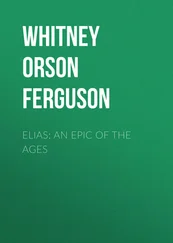That night his father grabbed him by the shoulder and took him to the cave. His father didn’t say a word, and neither did Abd al-Karim. He walked along with shaky feet wherever his father ordered him to go, and he heard his father saying something like he deserves to die. Abd al-Karim was convinced he was going to die, but he didn’t. Now, when he would tell the story to Alice, he’d nearly get his story in the cave mixed up with his grandfather’s. He’d tell the story of his father’s wife, and then the story of the hyena, to the point where he was sure he was the main character in both stories.
Abd al-Karim didn’t sleep in the cave that night. He was overcome with fear and cold. It was the middle of summer and yet he felt the cold gobbling him up. He didn’t know where he got the courage to do it, but he ran away. He walked the whole night out in the fields, thinking he was going toward Syria, but after three days of walking and never-ending stories, he wound up in Tripoli. There, in Tripoli, his journey began. From Tripoli to Beirut, from the bakery, to the restaurant, to the shoe-shine box, and from Nabaa to Ras Beirut.
In Tripoli, he worked at Master Rashid’s bakery. Master Rashid knew who he was and gave him a job in his bakery. And there he was engulfed with warmth: fire, warmth, and the aroma of baked bread, and the round loaves, round as the full moon. In the bakery, his fear of the cave came back to him. Night in the bakery was scary. Gandhi was afraid of sleeping upstairs next to Master Jafar with his big belly and beard and the sweat that dripped relentlessly from his body. Master Jafar was in front of the oven, the flames flashing in his eyes even as he slept. He’d eat and eat, as if he never got full, and sleep in the bakery, because he wasn’t married. Gandhi was scared of Jafar, scared of his snoring and questions about sex. Gandhi was afraid. He’d listen to the advice of Mrs. Rashida, Master Rashid’s wife, as she served him a bite of what she was cooking, to nourish his skinny body.
Gandhi loved Tripoli and he loved fish. 6But after three long years spent between the upstairs room, the deaf woman’s house, and delivering bread to customers’ houses, he decided to pack up and go to Beirut. Life in the bakery had become unbearable, and Master Rashid was never the same after his wife died. When Master Rashid asked him to learn to work the ovens, Little Gandhi felt he just couldn’t anymore. He decided to leave his job and go to Beirut. Without a good-bye to anyone, he picked up his things and off he went to Beirut, in search of Ms. Najat’s Restaurant. Ms. Najat, who used to visit her family in Tripoli from time to time, told him to come whenever he wanted, for a different kind of job. So he went, and in her restaurant he found out what it was to be alone, and how to live in the cold. Six years of cold and fear, things went on around him as if he didn’t see any of them. Little Gandhi told Alice that he wasn’t aware of things. He’d read bits of news from the papers wrapped around the loaves of bread, and he’d go to the movies, and see the customers, but he wasn’t aware. The fear that swallowed him in the cave at Mashta Hasan came with him to Tripoli, as he stood in front of the oven-cave of the bakery. Then this same fear took him to Beirut, to Najat’s moans and the pain in his knees that was to stay with him his whole life. He didn’t realize he’d started to see things until he came back from the village with Fawziyya and bought the shoe-shine box. Then Little Gandhi understood the meaning of life. He told his wife he had to get his head together. Life is what’s in your head, he said. He carried his head in his hands and set off for the entrance to the American University. He knew that working in the Nabaa area would be impossible, since poor people don’t have their shoes shined, and in the Burj area it would be expensive, because you have to pay half your salary to the thug protecting you. In front of Jarjoura Restaurant, however, you could sit and watch the AUB girls and live a nice life. True, the money wasn’t very good at first, but times changed and things got better.
Gandhi was afraid of death. Fawziyya would get pregnant, give birth, and then the baby would die. Four babies died, until Suad came and survived, and after her Husn lived, but with difficulty, thanks to Dr. Davis. For fear of risking Fawziyya’s health, the doctor ordered him to use condoms, and that’s another story. Then Fawziyya stopped getting pregnant, and Gandhi was relieved from death and condoms and got back to his work. He was trying to save some money to move from Dahr al-Jamal in Nabaa to Hamra Street, but the money didn’t hold out. Even when his restaurant was at its peak, he couldn’t save even one piaster.
Alice believed money does not last.
Alice used to tell him poor people’s money is like salt that melts in your hands, and evaporates with the water. She’d carry on with her never-ending memories, from Lieutenant Tannous to “The Leader,” and Gandhi would smile.
“You, my dear, are partial to officers.”
“Officers are the best,” Alice would answer. “You, what do you know. When an officer, with all his stars and stripes, bends down on the ground at your feet, and cries out in pain, and even better, when those stars themselves squirm in pain right before your eyes, it is then that you see the world as a totally different place. But everything is gone, even the money’s gone. Now look what’s become of me.”
Alice always loved to tell the story of Lieutenant Tannous, because when he left and his wife was standing at the door, he cried. He went back to her once, but she kicked him out, she slept with him and then kicked him out. As for “The Leader,” that’s another story.
At that time Alice was working at the Mirabelle Bar on Rawshi Street, when the impresario Abu Jamil came along. He knew Alice had suffered after Lieutenant Tannous left her. Abu Jamil came early in the morning and took her home with him. He placed a bottle of cognac in front of him and started drinking and talking. He told her about the “great deal.” “The best deal, Alice, is Mosul. You’ve been to Aleppo, but Mosul is totally different, Brits and army men and money, you can have anything you want. There’s a group going in two weeks, for one month, the salary is two thousand liras a week, not including tips, all expenses paid. Just say the word …”
The room was pitch black.
They told her that’s what the man had said. You go into the room and don’t turn on the lights, climb onto the bed naked, and after that he’ll come. He didn’t say who he was, he said he’d come, and don’t open your mouth.
The man waited for her outside. Alice was tired, for the third day in the Big Mosul Club had been exhausting. Englishmen and champagne bottles popping in the air, and the Greek woman from Beirut capturing their hearts, while Alice sat semi-isolated, feeling weak in the knees every time she stood up. When she’d go over to the customers’ tables and sit, her body would tense up. The hands pawing at her feet and thighs there were different, as though the fingers got stuck to her flesh and tore her. Alice felt she’d failed in Mosul. Anita, the Greek girl, was the winner this time. It had been Alice who had stolen the hearts of the commanders at Mirabelle in Beirut, with her laughter and hoarse voice and fading olive complexion. Here, she felt lonely and undesirable, as though they didn’t want anything to do with her dancing or her dimples or her big eyes.
At two o’clock in the morning, the man came and took her. She left the club without being noticed by anyone, to find herself in a black room. The curtains were drawn and she could smell Indian incense. At first she couldn’t see anything, then the darkness began to give way to a wide bed and a chair and a table. She took off her clothes and hung them over the chair and climbed onto the bed. She waited a long time. It seems she fell asleep. She woke up to a hand caressing her neck. She could smell a man, but saw nothing, and when she tried to speak, he put his hand over her mouth without saying a word. She was silent and let him do what he wanted. He had all of his clothes on, he didn’t even take off his shoes. He kissed her on her left cheek. His lips moved down and he moved down, and he collapsed between her feet. He stayed there a long time, and Alice got scared. The trembling of her thigh muscles extended to every corner of her body. There he was, he smelled like a combination of dust and salt. When he came up again and took hold of her breasts, she tried to turn in his direction to kiss him, but he pushed her away and turned his back to her. And so Alice went back to her first position, naked, and alone, and flat on her back. Alice kept quiet, left him to do what he pleased and shut her eyes. She tried to sleep. After a short while he came back to her, got on top of her and put his hands on her breasts, kissed her, and then seemed to want to sleep. He put his head on her stomach and didn’t move. Then he started pinching her all over her body. She moaned without crying out, the pain rippling down between her shoulders. Something of Mary Naquz had come back, something of that sexual pleasure Alice had known only once in her life and refused to repeat again afterward. The experience had come to her. The man, with all his clothes on, would move around her in the dark, then he’d settle down while she trembled, alone. She tried to take hold of his hand and put it on her chest, but the hand pulled away. He came close to her and flooded her with his whole body, then turned his back and went to sleep.
Читать дальше












